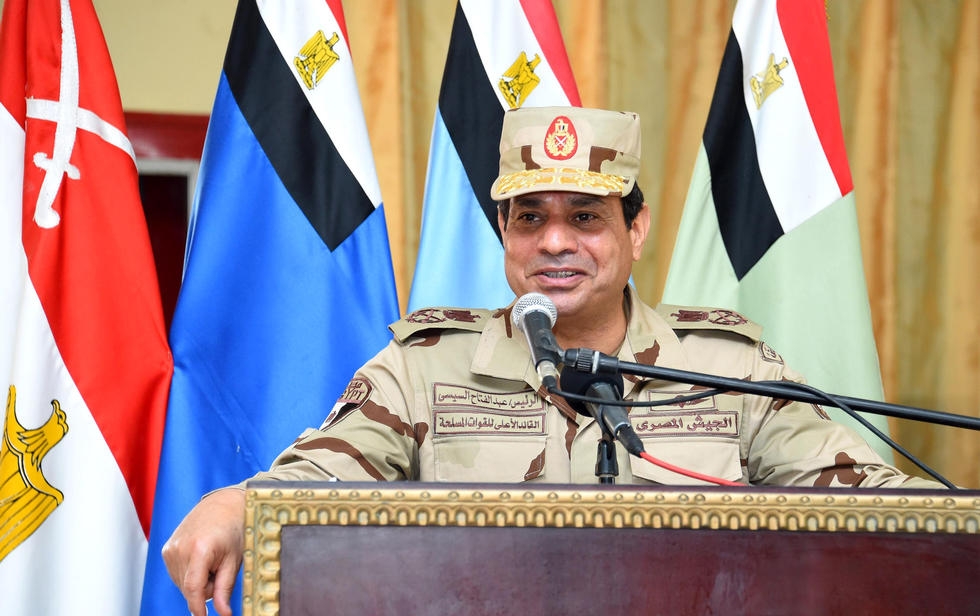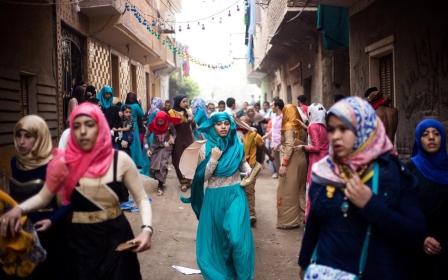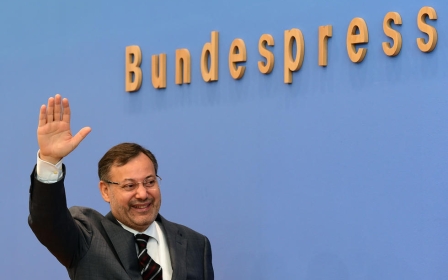Egyptian liberals: Double standards and the forsaking of values

When in November 2012, then-President Mohamed Morsi issued a constitutional declaration giving himself sweeping powers that put him above any court, Egypt was plunged into turmoil. His decision infuriated the country's secularist opposition which protested what it described as a ''seizure of dictatorial powers'' and''a coup against legitimacy."
Violent clashes broke out between Morsi's opponents and his Islamist supporters, signalling even more trouble ahead for the embattled president who would be overthrown six months later by military-backed protests .
I interviewed President Morsi for Egyptian state TV a week after he issued his controversial declaration. He defended the decree, insisting it was ''necessary to break the deadlock preventing the adoption of the new constitution''. He also promised to give up his extrajudicial powers once the constitution passed in a nationwide referendum.
Morsi had feared that the Supreme Constitutional Court - a holdover court from the Mubarak-era - was planning to annul the Islamist-majority Constituent Assembly. His fears were justified as the same court had earlier dissolved the first elected parliament, post revolution. At the risk of sounding like a Morsi apologist, I neither believe the decree was a ''power grab'' nor an attempt to drag the country back to authoritarianism. Rather, I see it as a desperate attempt by Morsi to move forward with the political roadmap he had vowed to follow.
Morsi's dispute with the opposition
Egypt's non-Islamists, however, refused to give Morsi the benefit of the doubt and piled pressure on him through continued street protests. Two weeks later, he was forced to revoke his decree in a bid to ease the tensions with his opponents. Nevertheless, he stopped short of rescinding an earlier decision to move ahead with the referendum on the constitution as planned. This put him on a direct collision course with the non-Islamists who insisted that the ''Islamist-tainted'' charter fell short of their revolutionary aspirations.
Surprisingly, the ''secularists'' who had been fiercely critical of Morsi throughout his tenure in office have drastically changed their attitude since his ousting, adopting a double standard towards matters pertaining to human rights and democracy.
Not only did they support the overthrow of Egypt's first democratically elected president, but they have since tolerated and justified multiple rights violations committed by the regime that replaced him. Few secularists have protested the jailing of tens of thousands of former regime supporters, the mass death sentences handed down to Muslim Brotherhood leaders and members, and the killings of at least 800 others in the violent dispersal of the Rabaa sit-in in Cairo on 14 August 2013.
Blaming the Brotherhood
Their antagonism towards the Islamists partly stems from the conviction that the latter are responsible for the violence plaguing the country. Non-Islamists are horrified by the wave of terror attacks that has targeted mainly police and the military but more recently, also judges, touristic sites and foreign missions. Many of them fail to differentiate between the Brotherhood - which insists it will continue to struggle ''through peaceful means to restore legitimacy'' - and other extremist groups that resort to violence to achieve their goals.
The government, too, has blamed the Brotherhood for the unrest, despite the Islamist group's condemnation of the attacks that have claimed the lives of at least 600 police and armed forces personnel in the past two years. The authorities insist on lumping all Islamist groups in one basket and have turned a deaf ear to claims of responsibility for many of the attacks by the Sinai-based ISIL-affiliate “Sinai Province.”
Even more astonishing perhaps is the fact that there has been hardly any outcry from the non-Islamists over the government's suppression of freedoms and the stifling of civil liberties in the name of ''national security''. At least 18 journalists currently languish in prisons for no other crime than doing their work. Meanwhile, dozens of secular activists are also serving jail time for violating a draconian protest law - in place since November 2013 - which bans protests without prior permission from the Interior Ministry. Some non-Islamists have defended the government's malpractices, parroting such rhetorical statements as ''this country needs to be ruled with an iron fist to prevent it from slipping into chaos''.
Why 'liberals' have forsaken their values
So what has happened to the Tahrir revolutionary spirit and why have Egypt's ''liberals" forsaken the values they profess?
There are several reasons for the abrupt change in the behaviour of the secularists. First, the fear that evaporated during the 2011 Tahrir protests has been reinstated. The military-backed authorities have used all means of intimidation possible to terrorise the public. The brutal security crackdown on the opposition that has seen outspoken critics jailed on charges of ''belonging to a terror group'', and has succeeded in restoring the lost fear. Conspiracy theories of ''foreign hands seeking to destroy Egypt'' propagated by regime loyalists in the media have also helped spread fear and fuel the xenophobia.
Moreover, the conflicts that have caused the collapse of several neighbouring countries and the very real threat of an ISIL presence in the region have also played their part in silencing the last of the few remaining critical voices.
President Abdel Fattah al-Sisi is meanwhile still perceived by the majority of non-Islamists as "the guardian of the revolution," despite his anti-revolutionary stances and his failure to deliver his promises of keeping the army out of politics, and restoring stability and security.
His chilling warning to "enemies of the state" following the assassination of Prosecutor General Hisham Barakat earlier this month signals the start of an even harsher security crackdown on dissent. In televised statements he made at Barakat's funeral, he gave judges the green light to expedite the death sentences handed down to Muslim Brotherhood leaders and promised tougher laws to "confront terrorism".
Emboldened by the warning, the cabinet last week approved a draconian counter-terrorism law condemned by Amnesty International as a ''flagrant attack on the rights of freedom of expression, assembly and association'.' By imposing hefty fines of up to 500,000 EP on journalists who contradict the official narrative on terrorist attacks, the bill can only be perceived as yet another repressive tool to stifle free expression.
The absence of a backlash from the "secularists" to the anti-terror law can only mean that Egypt's fledgling movement for change has all but been aborted by the counter-revolutionary forces that are now in power.
New strategy needed
What Sisi's supporters don't seem to realise is that the regime's heavy-handed policies have neither helped restore stability, nor rid the country of terrorism. If anything, there has been a surge in terrorist attacks in the past year and the assaults appear to have become even more violent in recent weeks. 450 kgs of TNT were used in last week's blast that destroyed the facade of the Italian consulate and caused extensive damage to surrounding buildings - a marked shift from previous attacks in which smaller, more primitive homemade bombs were used.
A new strategy is needed to restore stability and put Egypt back on the correct path to democracy. A step in the right direction would be for the authorities to respect the Constitution that guarantees and protects the rights of all citizens, regardless of their ideology. This would help defuse current political tensions and bring an end to the bitter polarisation.
The divisive media narrative must be replaced by an alternative campaign that allows voices of reason and tolerance to be heard. And the Egyptian judiciary, which has demonstrated its complicity with the authorities through politicised trials, must stop its selective approach to human rights.
The same can be said of the country's "secularists". Amid the nationalistic hysteria, their blurred vision and hostility toward the Islamists has compromised not just freedom of speech but all gains made by the 2011 revolution, helping reinstate Mubarak's police state. It is high time that the "liberals" play their role as "protectors of democratic ideals". To do that, they must forge a united front against oppression and promote the values they profess.
- Shahira Amin is a Cairo-based independent journalist who has won several international awards including Spain's Julio Anguita Parrado Journalism Award in 2012 and the Global Thinkers Forum's Excellence in Promoting gender equity Award 2013.
The views expressed in this article belong to the author and do not necessarily reflect the editorial policy of Middle East Eye.
Photo: Sisi adressing troops during a visit to the SInai Peninsula 4 July (AFP)
Middle East Eye propose une couverture et une analyse indépendantes et incomparables du Moyen-Orient, de l’Afrique du Nord et d’autres régions du monde. Pour en savoir plus sur la reprise de ce contenu et les frais qui s’appliquent, veuillez remplir ce formulaire [en anglais]. Pour en savoir plus sur MEE, cliquez ici [en anglais].





